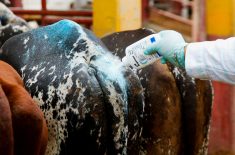The Manitoba Pork Council plans a “temporary pause” on all of its
research funding in light of what it called a “permanent moratorium” on the province’s hog industry.
The council’s announcement Thursday follows the provincial government’s indefinite moratorium, put in place March 3, on new or expanding hog operations in the province’s southeastern “hog alley” as well as its Red River Valley and Interlake regions.
“That funding has been put on hold for now so we can re-evaluate where we spend hog farmers’
money,” said MPC vice-chairman Bryan Ferriss, who farms near Swan River, well outside the three affected regions. The council, he said, “may be forced to put our own permanent moratorium on environmental research funding.”
Read Also

U.S. not ready to lift Mexican cattle ban over screwworm, Agriculture Secretary Rollins says
The U.S. is not yet ready to reopen its border to Mexican cattle amid an outbreak of the flesh-eating New World screwworm parasite, Agriculture Secretary Brooke Rollins said, but she is pleased with Mexico’s efforts to contain the pest.
The council said it had previously budgeted $583,000, collected from hog producers, for research funding during 2008. Beneficiaries were to have included the University of Manitoba, Lake Winnipeg Research Consortium, Manitoba Livestock Manure Management Initiative and Prairie Swine Centre.
The council said its announcement was spurred by the moratorium, which was announced the same day as the release of the provincial Clean Environment Commission’s (CEC) report on the environmental sustainability of the province’s hog sector.
The council on Thursday said the CEC report, which cost the province $750,000 to produce, did not specifically recommend a ban on new hog barn development in those areas, nor anywhere else in the province. The report concludes that Manitoba’s hog industry is in fact sustainable, the council said.
“Why should producers invest in environmental research when our government doesn’t listen to its own research results?” said Ferriss, who chairs MPC’s research committee, in the council’s press release. “The government has its own agenda — and it is based on political science, not research science.”
The indefinite moratoriums followed what the government had characterized as a provincewide “pause” in hog barn development, starting in November 2006 when the CEC’s report was first commissioned and continuing while the CEC panel carried out its review and hearings during 2007.










